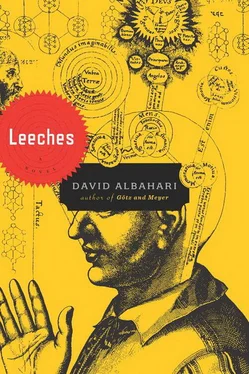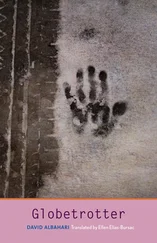investigation is not the best word, though at that moment I truly felt like a worn-out police inspector who, at the end of his boring career, finally comes across a spectacular case that radically changes his life, the only difference being that I had no desire at all to change my life. This is perhaps a strange thing to say for a person who lived in such a troubled, shattered country, in which very few managed to sustain even a shred of hope, but if I were to attempt an explanation, I would fail. There are some things one either knows or doesn't know, that's all. Ultimately my life did change, which I say with no regret, there is no point to regret, but I am giving it as a fact, especially because I feel that every fact is welcome in a story that has so few facts, at least in the form to which we are accustomed, and by saying that I mean those facts that free us from doubt, not facts that encourage us to doubt. In any case, a sentence in which the same word is repeated four times cannot be a good sentence and is a reliable reflection of the anxiety and powerlessness of the person who wrote it. I experienced that same powerlessness as I wrote the pieces for
Minut those last weeks. When I refer to the last weeks, I am thinking of the weeks during which the events set in motion by the slap along the riverbanks of the Danube were brought to a close. I recently got hold of a calendar for the year 1998, counted the days following the eighth of March, and established that it all took a little over nine weeks. What is nine weeks? Nothing. At the time, however, it seemed to be taking far longer, I even sometimes thought with despair that it would never end, that I would stay caught up in that merciless spiral for the rest of my life, which, tornadolike, sucked up everything in its path. In that chaos, which I am not doing a good enough job of conveying, I realize, the only constant was the pieces I was writing regularly and handing in every Wednesday by three P.M. at the latest. And of course, as time passed and I handed in each new piece later and later, they all screamed at me when I would come into the editorial office, text in hand. I mention this only because after the evening in the synagogue courtyard, as I climbed the stairs to Obilićev Venac and thought about the new cluster of signs, I remembered that when I had studied the map of Zemun, I had established that the neighborhood around the market, where I found a concentration of signs, consisted of nine city blocks. Why did that matter? Because nine men were seated around the wooden table in the courtyard of the synagogue; I was the tenth. At that point, of course, I didn't yet know that these events would last for nine weeks, but even so the coincidence was enough to prompt me to write about the role of numbers in our lives, which is what I told the editor in a phone conversation the next day. The editor was not thrilled, claiming that the subject matter was too obscure for your average reader, but I stood my ground, convinced that it was precisely the sort of subject that did engage readers, especially speculating about what might affect their lives. Other than Slobodan Milosevic, of course, I added. The editor smiled, even so it took my asking about Feliks the cat and his meowing before he relented, with the caveat that he would publish no esoteric writing. We have more than enough of the esoteric in our day-to-day lives, he said at the end of the conversation. The first thing I thought of was Dragan Mišović, though after our last conversation, in which I didn't come off too well, I was not overly eager to talk to him. On the other hand, who else could tell me more about numbers? He was the only mathematician I knew; no one else cared about numbers, and as things stand in today's world, mathematics will become a secret language only for the initiated. In many countries, I recently read, children are no longer able to do calculations in their head, by heart, and the multiplication tables are no longer the foundation of knowledge the way they used to be, because everybody has, or can easily get ahold of, a calculator, and calculate all sorts of things while essentially having no understanding of what is involved. And while some say this is good, because knowledge need not be the exclusive property of the educated minority, I see this as the ascendancy of mediocrity. The mediocre rule the world, no doubt, and it is normal that they adapt the world to their needs and intellectual capacity. In a store, for instance, there are times when I can add up the prices of the groceries I am buying faster than the woman at the cash register can, which always wins me the admiration of the salespeople and other customers. I wouldn't be surprised if one day they all burst into applause. But I digress. It is always easier to make plans than to follow them up, and this was something that forever plagued me in my earlier life, the life I had to leave behind six years ago when I started this new one, which doesn't much resemble life. I was sometimes known to say that I dreamed of a life far away from historical divides and would be happiest to spend all my days reading and writing and listening to music, and now, when I am living far from history, when my time is all my own, I'm trying to reconstruct the events that led to it and am shamelessly saying, here and now, that I can imagine no other life, that I long for what I used to consider useless sludge. But back to the question of numbers, they are at least impartial, feelings mean nothing to them, one number is like any other, though, on the other hand, each is unique. It sounds as if I am talking about people, and that may have been my thinking when I proposed to the editor of
Minut a piece about the role numbers play in our lives. It is amazing that something that doesn't exist in nature, in any form, plays such an important role in our conceptualization of the world. It would be more natural not to know numbers, which probably was the case long ago, because that brings us closer to the original construct of the universe, and this was recently confirmed. I read in
Politikin Zabavnik that a tribe was discovered in the jungles of the Amazon who had no notion of numbers and could not count. If a member of the tribe caught two fish, a second one caught three, a third one caught five, they made no distinction. Fish are fish, and that was that. It is a long way from there to the numbers tattooed on people's skin in concentration camps, and I wanted to write the piece for my column in
Minut about that journey, from a number that does not exist to the number that was the entrance ticket to the death chamber. When I did write the piece, it looked different, as so often happens when we write, and I focused mostly on numbers in the Jewish tradition and on the fact that many things in their religious practice are defined in numbers, such as, for instance, the Thirteen Divine Attributes, the Ten Commandments, the 613 commandments, or mitzvoth, the 231 permutations in the order of the alphabet through which the world is created, and here I also had to mention, which I now see as an exceptionally important detail, the ten Sephirot, or degrees, through which God is manifested in the world. The editor had worried needlessly; the piece did draw readers, and the same day it was published email began pouring in, followed with a lag of several days by real, old-fashioned letters, two or three postcards, and even a small package, which, for reasons of security, I never opened but tossed into the nearest trash basket on my way out of the editorial office. The messages were mostly voicing praise and respect for the Jewish tradition, though there were also unfavorable comments, even open attacks and accusations of excessive love for "Jewish scum." One letter looked like a ransom note from a crime novel, it was composed of letters, words, and parts of sentences cut from the daily and weekly press. It was long, and I felt a begrudging admiration for the person willing to spend so many hours with all that finicky cutting and pasting, probably while wearing plastic gloves to avoid leaving fingerprints on the scissors, glue tube, and newspapers. After finishing the job, when he had finally taken off the gloves, his skin must have been all puckered and wrinkled from sweat. Some of the phrases in the 1 etter irresistibly reminded me of what I had heard in my encounter with the hard-core nationalists, and I had a feeling they would soon reemerge, which was promised, more or less, in the final sentence in the pasted letter. We will see who is right, the sentence said, composed of eight little slips of newspaper, among which I recognized two letters cut from
Читать дальше







![David Jagusson - Fesselspiele mit Meister David [Hardcore BDSM]](/books/486693/david-jagusson-fesselspiele-mit-meister-david-har-thumb.webp)




